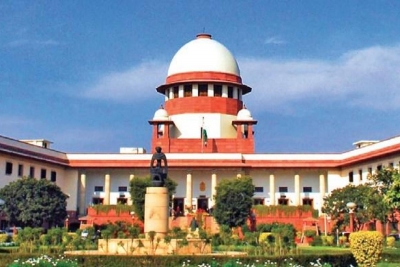Centre to SC: Revised vax policy on requests from CMs, health ministers
By IANS | Published: June 27, 2021 12:06 AM2021-06-27T00:06:05+5:302021-06-27T00:45:17+5:30
New Delhi, June 27 The Centre has told the Supreme Court that the Prime Minister announced the revised ...

Centre to SC: Revised vax policy on requests from CMs, health ministers
New Delhi, June 27 The Centre has told the Supreme Court that the Prime Minister announced the revised vaccination policy on June 7 after receiving requests from chief ministers of 13 states as well as health ministers of various states.
"The revised guidelines were announced by the Prime Minister on June 7 and has come into effect from June 21. The said decision to review the strategy was taken after receipt of letters from 13 Chief Ministers as well as Health Ministers of various states and after debating and deliberating the pros and cons of such a decision", said the Centre in its affidavit.
According to the Centre, after receiving suggestions from various CMs and other officials, it was decided to review the strategy to factor in the problems highlighted by the state governments and keeping in mind the main objective of maximising vaccination in the minimum possible time under the most extraordinary and unprecedented circumstances being faced by humanity in general and by India in particular.
Two meetings were conducted at the level of highest political executive of the country on May 15 and May 21, where the issues were flagged, discussed and debated in the meeting of National Expert Group on Vaccine Administration of Covid-19' (NEGVAC).
The Centre said during the period of Phase I and Phase II of vaccination drive meetings were held, where several state governments, mostly through their chief ministers, repeatedly suggested and requested for flexibility/autonomy to the state governments in procurement of vaccine.
The Centre said the states were seeking variation in this drive broadly on the following counts- " (i) the State Governments wanted autonomy on the ground that health is a state subject under the Constitution of India; (ii) many State Governments were desirous of expanding vaccination to the groups beyond the priority groups identified by the Central Government and wanted to simultaneously vaccinate persons of 18 to 44 years of age group; (iii) the State Governments were insisting for being permitted to procure vaccines doses directly from manufacturers and administer such doses as per their respective prioritisation based on local situations".
The top court had rapped the Centre on June 2, as it found its vaccination policy as "prime facie arbitrary and irrational" for making the states to pay for procuring jabs. The Centre said with the new policy, which came into effect on June 21, all persons above 18 years of age throughout the country are entitled to get free vaccination irrespective of their financial position.
"To put it differently, a person below poverty line and a multi-millionaire are equally entitled for the very same vaccine in the age group of 18 years and above free of cost," said the 380-page Centre's affidavit.
The Centre emphasised that walk-in vaccination was permissible for all and digital divide was not a constraint.
Defending its vaccine policy, the Centre said the opinion expressed by experts was based upon the rationale and logic that manufacturers would not have any incentive to augment their manufacturing potential and manufacture more vaccine doses, unless they have an incentive of selling some defined portion of their manufactured vaccines at the rates decided by them, so that they can sell vaccines to the Central Government after cross subsidisation.
"It is submitted that the factual position is that there are handful of vaccine manufacturers in the world….. It also cannot be disputed that unless the vaccine manufacturers have an incentive or financial ability, they may either not have the capacity to augment their potential or may not sense the viability to do so. The executive policy decisions are taken, under such circumstances, keeping the unprecedented circumstances being dealt with by the world in general and by India in particular, in mind", added the affidavit.
The Centre said in response to these suggestions, with effect from May 1, the government revised the guidelines under the ‘Liberalised Pricing and Accelerated National Covid Vaccination Strategy' in such unprecedented circumstances.
The Centre said it also introduced a new concept in the reviewed policy to make private vaccination centres accessible to economically weaker sections of the society also by use of "Non-Transferable Vouchers".
On the status of COVID-19 vaccine for children, the affidavit added, "It is submitted that Zydus Cadila which is developing DNA vaccines has concluded its clinical trial for between the age group of 12 to 18 years of age and subject to the statutory permissions, the same may be available in near future for children in the age group of 12 to 18 years of age."
Disclaimer: This post has been auto-published from an agency feed without any modifications to the text and has not been reviewed by an editor
Open in app